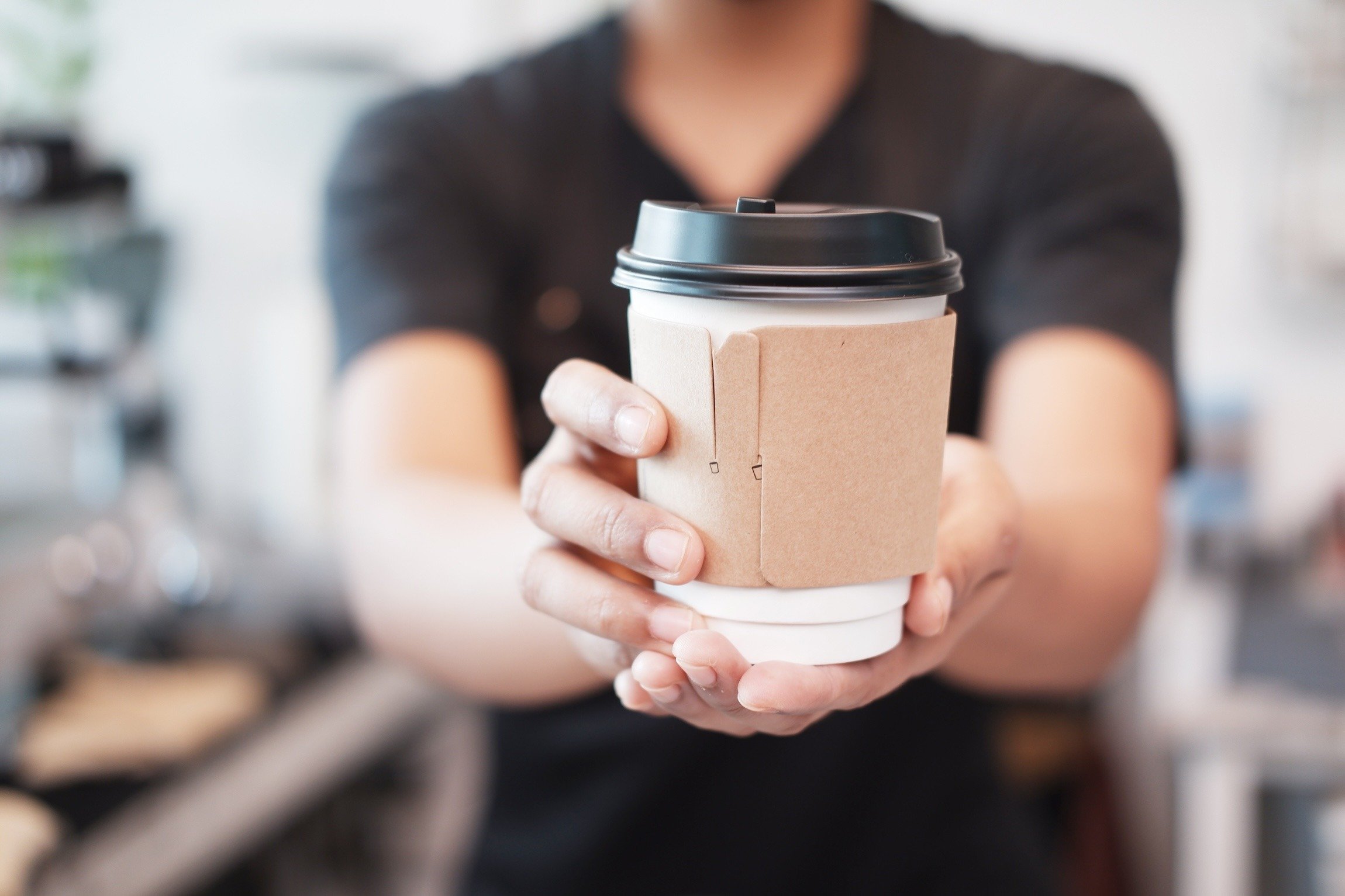
This article outlines:
10 common growing pains experienced by coffee companies
Strategies for effectively scaling your coffee business
How Olo’s restaurant tech solutions support emerging coffee companies
Coffee companies are up against it. The market is saturated with coffee shops on just about every corner. Profit margins are tight, teams are lean, and guests have sky-high expectations for speed, convenience, service, consistency, quality, and personalization.
And yet, the odds of fostering a loyal guest base are in your favor. 51% of Americans purchase from a coffee shop at least once a week‚ and 8% visit daily.
After 20 years of enabling coffee companies to drive sales and do more with less, we've compiled a list of the most common growing pains coffee shops contend with‚ plus, proven strategies and tools you can use to tackle them.
10 pain points emerging coffee companies know all too well
1. Fierce competition
With big-name coffee companies everywhere you look and countless home-brewing options at the grocery store, you have to work extremely hard to differentiate your brand, offerings, and guest experience.
2. Tight margins
While every restaurant has to contend with overhead costs like rent, utilities, and technology, coffee companies have especially tight margins. When you subtract the cost of the beans, cup, syrup, milk, etc. from each coffee sold, there's little opportunity for profit. To make revenue, coffee companies have to maximize order volume. In other words, serve a lot of guests and sell a lot of cups.
3. Lack of tech integration
When data isn't shared between restaurant systems like your coffee shop‚ online ordering platform and POS, it's difficult to stay on top of orders from multiple channels (drive-thru, third-party marketplace, app, dine-in, etc.). Additionally, you aren't getting a comprehensive view of the guest journey and can't leverage that intel to make smarter business decisions.
4. Inventory management
Managing the inventory of coffee beans, syrups, milk, and other supplies can be challenging. For example, coffee shops use a tremendous amount of dairy products, which have a short shelf life and require meticulous temperature control. Coffee beans and pastries must also stay fresh, and cold brews require days of preparation. To prevent discrepancies that can negatively impact service quality and profitability, you must diligently track what's in stock and what needs to be ordered.
5. Order inaccuracies
When you're mostly serving people who recently woke up, are racing to work, and ordered something hot, there's little room for error. And yet, emerging coffee companies often encounter errors in order transmission from the POS system to the barista or kitchen. These misfires can lead to delays, unintentionally cold coffee and food, unhappy guests, and wasted ingredients.

6. Sky-high guest expectations
Unlike typical restaurants, coffee shops have daily regulars, many of which habitually order the same drink at approximately the same time. Caffeine is addictive, after all. Every guest expects a frictionless, fast experience‚ and that hot coffee better be hot. But regulars also want to feel known. A good barista will remember their name and drink order (bonus points for details like two pumps of vanilla, no foam‚ etc). Meeting these expectations gets increasingly difficult as order volume rises.
7. Evolving preferences and innovation
Between ever-evolving guest preferences and the breakneck speed of technology innovation, think QR codes, passwordless login and checkout, and AI‚ your coffee company must be extremely agile to meet guests‚ needs, stay competitive, and retrain employees as needed.
8. Labor challenges
A coffee shop‚ high-stress, fast-paced environment requires intensive training and makes attracting and retaining employees difficult. Since most coffee companies require multiple baristas in addition to a front-of-house team member, and employees have different skill sets‚ some are artisans behind the bar while others are fast at taking orders‚ shift scheduling can be a headache.
9. Guest relationships are employee-dependent
If your guest relationships are entirely dependent on individual baristas‚ in other words, they don't feel a strong connection to your brand as a whole‚ staff turnover will negatively impact guest retention. And, as any growing coffee company knows, some turnover is an inevitable part of doing business.
10. Secure payments and data
As your coffee company matures and the number of digital transactions increases, it's important to prioritize the security of your guests‚ payments and data without slowing down the payment process for guests. A legacy payment system without built-in fraud protection can put your guests‚ sensitive information and the reputation of your business at risk.
Strategies for effectively scaling your coffee business
With so much competition, emerging coffee companies need a strong brand identity and a differentiated guest experience to bolster retention and attract new guests.
In this day and age that means meeting the needs of digital-first consumers, including offering convenient ordering and secure payment methods, multiple handoff modes, personalized recommendations, and 1:1 marketing.
It takes a fully integrated, enterprise-grade tech stack to deliver on those guest expectations and keep coffee shop operations running smoothly, especially during the morning rush.
The right system will enable your staff to stay on top of orders from multiple channels without juggling tablets, spend less time on tedious tasks‚ ike inventory management, shift scheduling, taking drive-thru orders, etc.‚ quickly get new team members up to speed, and make every guest feel like a regular. On the flip side, guests will get the convenience, speed of service, and personalized experience they crave.
While baristas often drive repeat orders by memorizing guests‚ names, favorite drinks, and personal anecdotes, leading coffee companies know the key to sustainable guest relationships is providing a consistent experience.
It starts with creating an institutional memory rooted in data. A guest data platform, for example, can ensure all team members‚ regardless of how long they've been with your brand or their typical shift‚ can deliver the same individualized service regulars expect and appreciate.
Think of it this way: if every employee knows exactly when and what drinks your high-value guests order, you can staff appropriately, anticipate guests‚ needs, prepare items in advance, and make data-driven recommendations (Would you like to order the blueberry scone again?)‚ all of which boost revenue.
With such tight margins, growing coffee companies must seize every opportunity to increase efficiency, maximize throughput, reduce order inaccuracies, prevent waste, and drive order frequency and spending. That includes diversifying revenue streams with delivery, catering, events, or retail.
But before implementing a new sales channel or tech solution, make sure you prioritize guest- and staff-centric problem-solving. By reducing manual work, stress, and operational inefficiencies, you can prevent burnout and enable your coffee shop employees to provide exceptional service‚ which, in turn, motivates guests to spend more, return often, and tell their friends.
How Olo's restaurant tech solutions support emerging coffee companies
Olo has always had a special connection to coffee companies. Our founder and CEO, Noah Glass, created Olo 20 years ago based on his desire to avoid long lines and grab a quick coffee on his morning commute.
The coffee shop had no record of who I was, beyond greeting the barista who punched in my order, Noah recalls. Then came an idea: What if you could order and pay for that coffee from your phone and have it ready upon arrival?
Two decades later, Olo remains committed to helping coffee brands like Dutch Bros remove friction from the ordering and payment process, speed up operations, increase employee satisfaction, and personalize the guest experience.
Ready to accelerate the future of your coffee company? Request a demo of Olo's end-to-end, modular technology platform‚ directly inspired by the real-world challenges your coffee shops encounter daily.
